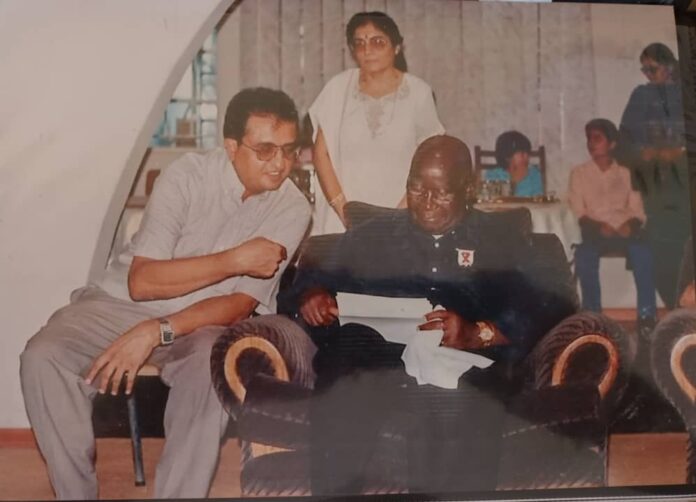Thakorbhai Lallubhai Desai was one of the country’s iconic freedom fighters during the British colonial rule and he travelled to New York, in the United States of America (USA) to give evidence before a United Nations Committee on Colonialism. Is he a forgotten icon?
“Definitely a forgotten hero;” said his son Ashok Desai. He sacrificed business, time and his family’s comfort to liberate the country, then called Northern Rhodesia which became independent as Republic of Zambia on 24 October, 1964, but the hero died a year later.
Thakorbhai Lallubhai Desai died on 03 April 1965, and Zambia’s first President Kenneth Kaunda attended his funeral service.
He was buried at Ndola’s Kansenji (Kansenshi) Cemetery. Being a Hindu, he was to be cremated but his wish was to be buried on the Zambian soil at a burial attended among others, the first African Mayor of the “Friendly City” of Ndola, Alderman Tom Mtine.
A Zambian of Indian origin, Mr Desai was a member of the Legislative Assembly for Ndola West on the Copperbelt in January1964. He strongly believed nothing can be achieved by violence and revenge.
In a handwritten message to his family, President Kaunda said: “Head of this family loved Zambia consistently and faithfully served Zambia. He helped to found One Zambia, One Nation for Zambia. He travelled to the United Nations. Let this family continue in his noble footsteps.”
Dr Kaunda wrote the message on his visit to Ashok Desai’s house in Ndola on February 22, 2002.

The hearing at the United Nations was held on 19 April, 1962 in the Special Political and Decolonization Committee (Fourth Committee) of the General Assembly.
The United National Independence Party (UNIP) delegation to New York from Northern Rhodesia (Zambia) also included then party President Dr Kaunda, Sir Stewart Gore-Browne, Arthur Wina and Kapasa Makasa (formerly Robert Makasa).
In his manifesto for Northern Rhodesia’s election of 15, 15 15 seats of sharing which he lost, Mr Desai said in his young days, he fought for Indian Independence using only methods of NON-VIOLENCE.
He said: “All the time I have been in UNIP.I have always stressed that nothing can be achieved by violence and revenge. I shall not change when UNIP comes to power.”
Mr Desai was born in 1914 and was educated at the Government High School, SURAT, INDIA. He came to Northern Rhodesia and lived in Chondwe, Broken Hill (Kabwe), in Central Province, Luanshya and Ndola on the Copperbelt.
He was married with five children, all of whom were born in Northern Rhodesia. He had been successfully honorary Secretary of Ndola Hindu Samaj, British Indian Association of Ndola, Executive member of Parent Teachers Association of Ndola Asian School and member of the Medical Advisory Board, European Hospital, Ndola.

He was president of the Oriental Sports Club, Ndola. For 25 years, he served as a crown interpreter and he spoke Lamba fluently.
Ever since he came to Northern Rhodesia(Zambia), he had been a businessman, He owned properties in Ndola, Broken Hill (Kabwe), Kashitu and Chondwe.
“I have travelled to BRITAIN AND UNITEDSTATES OF AMERICA when I gave evidence before a UNITED NATIONS COMMITTEE of seventeen on COLONIALISM”, he said.
He was a keen cricketer and badminton player. His main recreation was reading biography, African Affairs and current events.
He was an admirer of Indian Mahatma Gandhi, Jawaharlal Nehru (India); Wilson Churchill (Britain) and Kaunda (Zambia).
He opposed amalgamation of the two Rhodesias – Northern Rhodesia (Zambia) and Southern Rhodesia (Zimbabwe) – at the time BREDISLOE COMMISSION in 1937 and opposed the Federation of Rhodesia and Nyasaland before and after its inception.
“This is my home. I am an AFRICAN of INDIANORIGIN,” he said in his manifesto.
Although he condemned and deplored Northern Rhodesia’s constitution because it contained elements of racism, he stood as a candidate in LUANSHYA-KANSENJI constituency UPPER ROLL in the 1962 general elections because he believed he could honestly represent his constituency in the Legislative Council whatever their race.
The outcome of the election was that the Legislative Council had 15 United Federal Party (UFP) members, 14 UNIP members and five for African National Congress (ANC).
Mr Desai vowed: “I have always spoken the truth, without fear and I shall continue to do so. I am often asked why as a businessman and property owner I did not fear the coming of a popularly elected Government.”
His answer to that was that property and economic stability came to the country when all races learnt to live in harmony.
The 1962 elections gave the best chance electorates ever had for a smooth transition from a white minority rule to truly democratic Government.
To vote, UNIP would bring peace and progress. To vote Liberal meant a continuation of UNCERTAINTY. A vote for UFP meant continuing INSTABILITY.
He said the people’s enemy was not communism or repressive BLACK GOVERNMENT but FEAR. He joined UNIP because it had repeatedly stressed its belief in FUNDAMENTAL HUMAN RIGHTS, Europeans, Asians and Euro-Africans as minorities had no security unless they believed in the declaration of HUMAN RIGHTS.

Discover more from MAKANDAY
Subscribe to get the latest posts sent to your email.



